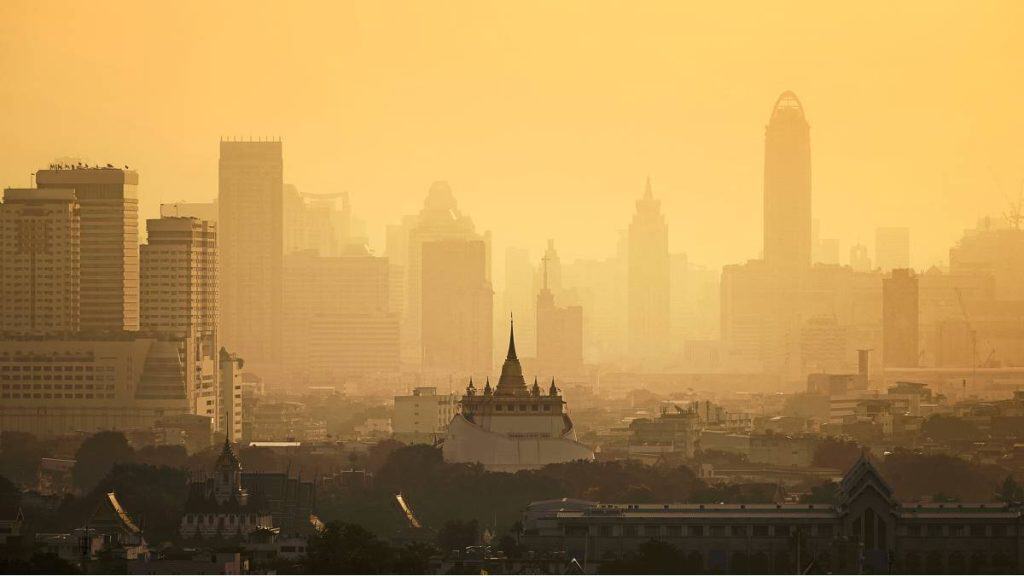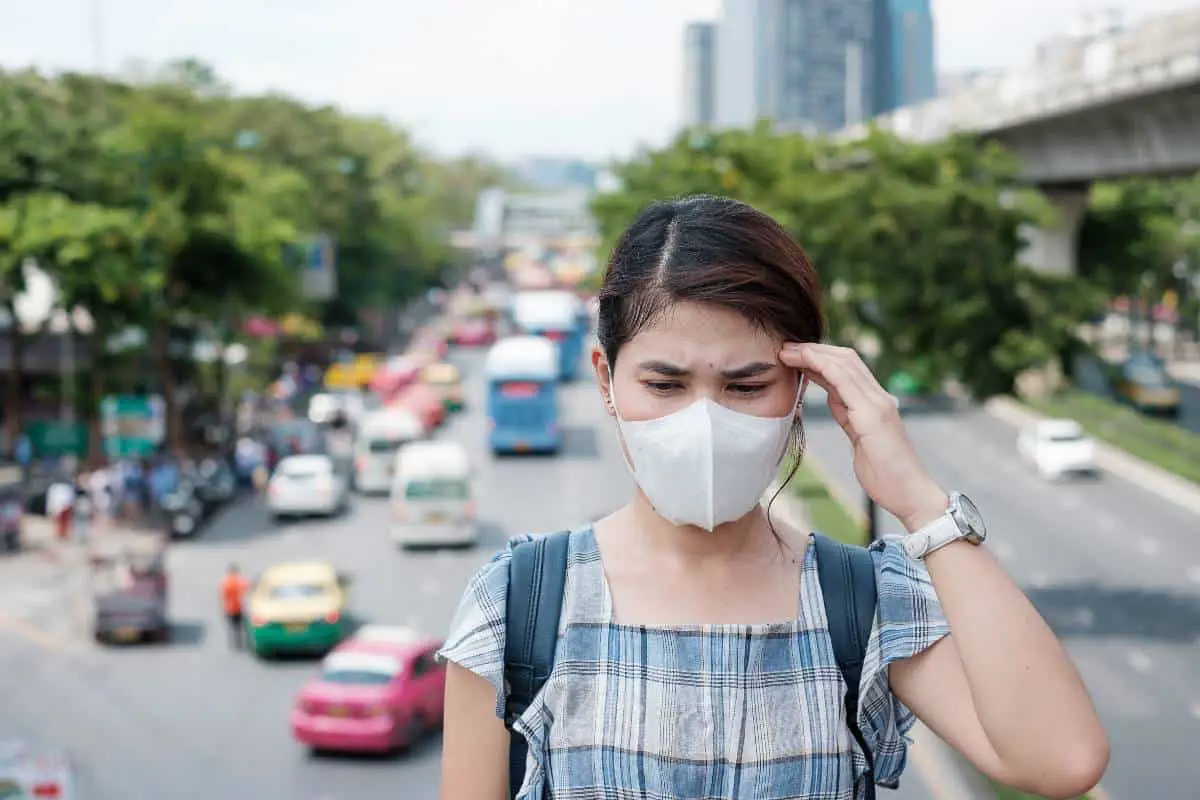The Problem with Air Pollution in Thailand
Living in Thailand has always been a dream – the vibrant street life, warm smiles, and stunning landscapes, but the challenge of maintaining clean air is a growing concern. But lately, something’s changed. The hazy skies have become our unwelcome companion, making every breath a reminder of our changing environment. As I wipe my stinging eyes and notice my persistent cough, I realize this isn’t just about cloudy views anymore. It’s about our health, our future, and the Thailand we want to preserve.
Key Takeaways
- Thailand’s air pollution has worsened due to increased industrial activity, vehicle emissions, and agricultural burning practices.
- The problem affects daily life, forcing school closures and event cancellations while impacting tourism and business.
- Individual actions help, but solving the crisis requires stronger government regulations and regional cooperation.
Why is it So Bad This Year?
It feels like the air pollution is worse than ever this year. I’ve been reading up on it, and it seems like a combination of factors is to blame. The post-COVID economic resurgence has meant more cars on the roads and increased industrial activity. We’ve also had less rainfall than usual, which means pollutants are hanging around in the air for longer. And then there’s the smoke from agricultural burning in neighboring countries – it seems like Thailand can’t catch a break! In fact, a recent study showed that Thailand’s annual average particulate pollution increased by almost 11% in 2020, raising concerns for public health in 2023.
The Impact on Daily Life
Beyond the health concerns, the poor air quality is impacting daily life in Thailand. Schools are closing, outdoor events are being canceled, and people are hesitant to venture outside. It’s disrupting business, tourism, and the overall quality of life. I’ve had to reschedule several property viewings and meetings because clients are concerned about the air quality and pollution control measures in place.
What’s Causing the Problem?
From what I’ve gathered, the main culprits behind Thailand’s air pollution are industrial emissions, vehicle exhaust, and agricultural practices. Let’s take a closer look at each of these:
Industrial Emissions
Thailand’s rapid industrial growth has undeniably contributed to the air pollution problem. Factories and power plants release a mix of harmful pollutants, including sulfur dioxide, nitrogen oxides, and particulate matter . These pollutants not only affect our respiratory health but also contribute to acid rain and smog.
Specific Examples
The Map Ta Phut Industrial Estate in Rayong province is a major source of industrial pollution, with petrochemical plants releasing significant amounts of volatile organic compounds (VOCs). In Bangkok, the concentration of factories and industrial zones contributes to the city’s persistent air quality issues.
Vehicle Emissions
With the increasing number of vehicles on the roads, it’s no surprise that vehicle emissions are a major contributor to air pollution, prompting calls for better pollution control. Every time I’m stuck in Bangkok traffic, I can’t help but think about the exhaust fumes filling the air and the urgent need for improved pollution control measures. These emissions contain harmful pollutants like carbon monoxide and hydrocarbons, which can have serious health consequences.
The Rise of Diesel Vehicles
A significant portion of vehicle emissions in Thailand comes from older diesel-powered vehicles, particularly trucks and buses. These vehicles often lack adequate emission control systems, contributing to higher levels of particulate matter pollution.
Agricultural Practices
While it might not be as obvious as the other sources, agricultural practices, especially the open burning of crop residue, play a significant role in Thailand’s air pollution, affecting environmental health. Farmers often burn agricultural waste to clear their fields, releasing harmful pollutants into the atmosphere.
The Burning Season
The “burning season” in Thailand, which typically occurs between December and April, sees a significant increase in air pollution due to agricultural burning. This practice is particularly prevalent in the northern regions, where farmers burn rice straw and sugarcane leaves after harvest.

What Can We Do?
It’s easy to feel overwhelmed by the scale of the problem, but I believe we can all do our part to improve the situation. Here are a few things I’m trying to do:
- Stay Informed: I regularly check the air quality index (AQI) using apps like AirVisual to stay updated on pollution levels in my area.
- Limit Outdoor Activities: When the AQI is high, I try to minimize my time outdoors, especially during peak hours, to reduce my exposure to harmful particles.
- Wear a Mask to protect yourself from harmful particles in the air. I’ve started wearing an N95 mask whenever I’m outside, especially in heavily polluted areas.
- Support Sustainable Practices: I try to support businesses and initiatives that promote sustainable practices and reduce their environmental impact.
- Reduce My Carbon Footprint: I’m making an effort to reduce my own carbon footprint by using public transportation, cycling, and walking whenever possible.
The Importance of Collective Action
Individual actions are important, but addressing air pollution effectively requires collective action supported by the ministry of public health. We need stronger government regulations, stricter enforcement from the pollution control department, and greater corporate responsibility to combat air pollution. We also need to support initiatives that promote sustainable agriculture, clean energy, and public transportation.
The Psychological Effects of Air Pollution
Beyond the physical health impacts, air pollution can also take a toll on our mental health, contributing to obstructive stress and anxiety. Studies have shown that exposure to air pollution can increase stress, anxiety, and depression. The constant worry about the air we breathe can create a sense of unease and affect our overall well-being, emphasizing the need for clean air initiatives.
The Economic Costs of Air Pollution
Air pollution has significant economic costs for Thailand. Healthcare expenses related to respiratory and cardiovascular diseases are on the rise. Lost productivity due to illness and school closures also impacts the economy. Furthermore, the haze can deter tourists, affecting the tourism industry, a crucial sector of Thailand’s economy.
International Cooperation: Addressing Transboundary Haze
Transboundary haze, caused by agricultural burning in neighboring countries, is a major contributor to air pollution in Thailand. Addressing this issue requires regional cooperation and collaboration. Thailand has been working with countries like Myanmar and Laos to implement measures to reduce cross-border haze.
Construction and Urban Development’s Impact on Air Quality in Thailand
As a real estate developer in Bangkok, I witnessed firsthand how Thailand’s rapid urbanization affects our air quality index (AQI). The constant construction of condominiums, shopping centers, and office buildings across Thai provinces generates significant PM2.5 and particulate matter. The Thai capital’s skyline transformation comes at an environmental cost, with construction sites being major sources of air pollution.
Key Concerns:
- Public Health Impact: Construction dust contributes to respiratory issues and pulmonary diseases, particularly affecting residents near development zones
- Environmental Management: The Bangkok Metropolitan Administration struggles to control emission levels at construction sites
- Air Quality Monitoring: IQAir data shows elevated PM2.5 concentrations near major development projects
These construction-related pollution levels require strong pollution control measures and collaboration between the Ministry of Public Health and the pollution control department. With Thailand’s air quality crisis intensifying in 2024, particularly in cities such as Bangkok and Chiang Mai, addressing construction-related emissions becomes crucial for environmental health.
The Thai government must balance urban development with clean air initiatives, implementing stricter controls on volatile organic compounds and enforcing comprehensive environmental management strategies to protect public health.
FAQs
What are the major sources of air pollution in Thailand?
How does Thailand’s air quality compare to other countries in 2025?
What is PM2.5 and why is it significant for air quality?
What is the annual average PM2.5 concentration in Thailand?
How can I connect with IQAir for real-time air quality updates?
Conclusion
As a Thai living through these hazy days, I feel the weight of our air quality crisis deeply. While I’m no expert, I see how it affects all of us – from my grandmother’s morning walks being cancelled to my nephew’s school moving activities indoors. The solution isn’t simple, but together, through small daily actions and supporting positive change, we can work toward clearer skies for our beautiful Thailand. After all, the air we breathe connects us all, and every step toward improvement matters. Contact me if you have any questions!






